Ed O'Brien: "The guitar to me is like an oscillator on a synthesizer - it’s the start of a sound rather than the sound in itself"
Total Guitar joins the six-stringer to discuss his plethora of effects pedals, the future of Radiohead and his debut solo album as EOB, Earth
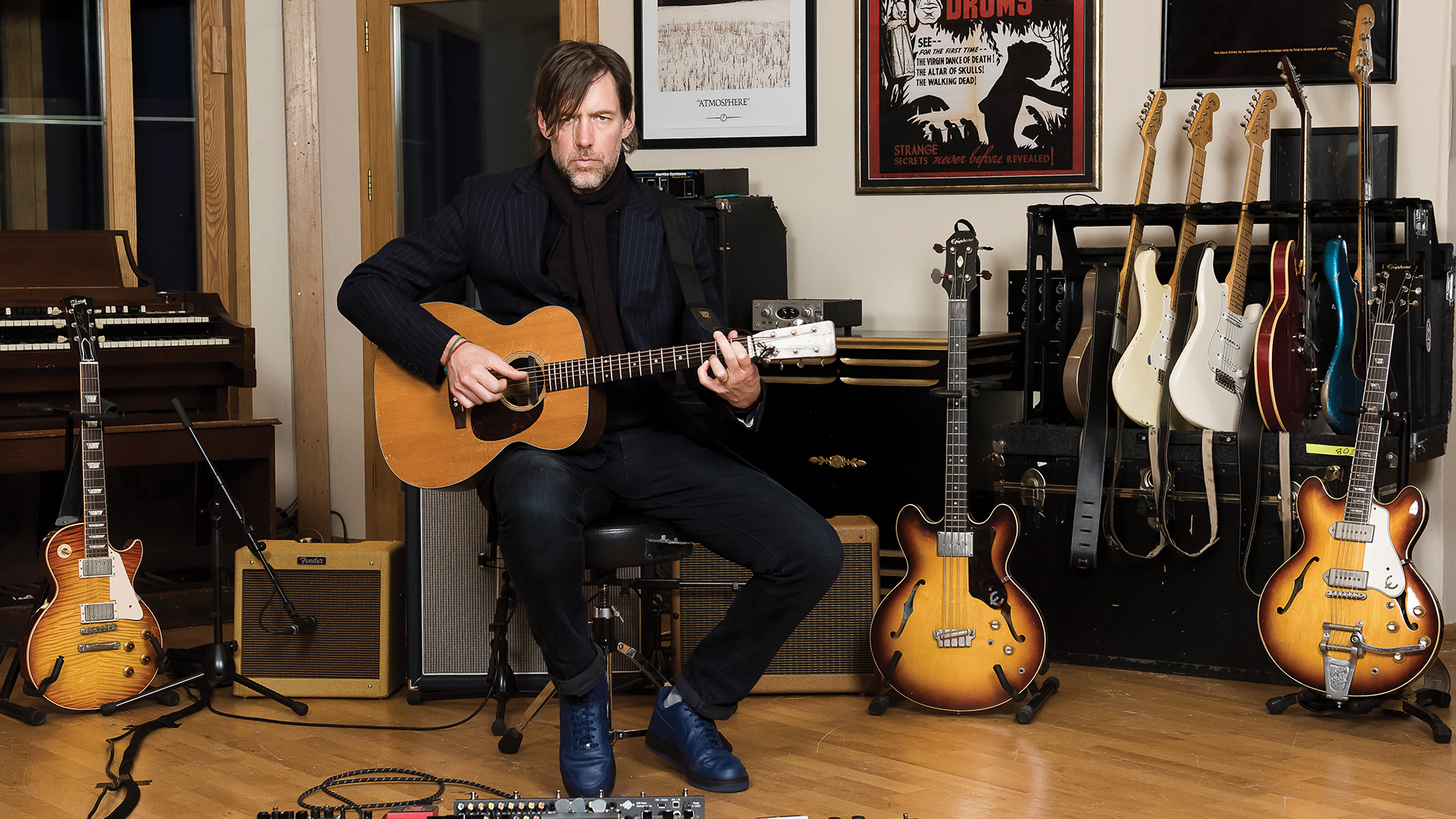
“It’s magnificent... Like an old Rolls Royce,” says Radiohead guitarist Ed O’Brien, pointing to the Cadac desk which once belonged to his main band and ended up being sold to producers Alan Moulder and Flood.
It was here at West London’s Assault & Battery Studios, with Moulder and Flood, that O’Brien recorded and mixed parts of his first solo record as EOB. Prior to that, the analogue console had resided at Wessex Sound Studios and was used to track some of the greatest rock albums of the late '70s, including the Sex Pistols’ Never Mind The Bollocks, The Clash’s London Calling and Queen’s Sheer Heart Attack.
This old console has earned its place in history - and the same could be said of O’Brien himself. As a founding member of one of the most important guitar bands in popular music, O’Brien has been the recipient of countless awards and accolades, although he chooses not to dwell on such merits.
Instead, he is the kind of musician who prefers to live in the present - you quickly get the impression he only measures himself on what he has in front of him right now.
Over an afternoon of walking TG through the guitars, amps and pedals used on Earth, plucking through Beatles-y closer Cloak Of The Night on his Martin during our photoshoot, the Radiohead guitarist is every bit as earnest and sincere as the music he is known for. “It’s funny, because people thought this would be more of an ambient album or textural kind of thing,” he says, when told this latest work is surprisingly guitar-heavy in places.
“Maybe that’s what they see as my role in Radiohead. A lot of the responses so far have been like, ‘I had no idea you’d do something like this,’ which is always great to hear. With this, I wanted to make something very direct, but I guess with all that texture and color, too...”
You started writing in Brazil. Was the environment reflected in what you came out with?
Get The Pick Newsletter
All the latest guitar news, interviews, lessons, reviews, deals and more, direct to your inbox!
Being in Brazil made me feel like I had time... And it had been years since I felt like that
“For me, being in Brazil made me feel like I had time... And it had been years since I felt like that. I could dedicate myself to being a songwriter because I never really had the time before or worked out how to do it.
"I’d written bits and pieces like getting the computer out, a lot of electronic gear and making something electronic, but after about six weeks I wasn’t getting anything back. Normally you get over the hump of things and know where to give it a start.
"Then I saw my Martin 000 sitting in the corner and I realized all I wanted to do was pick it up and start playing it. And so I did - I thought, ‘Fuck this, let’s do what I want to do rather than what I think I should be doing!’”
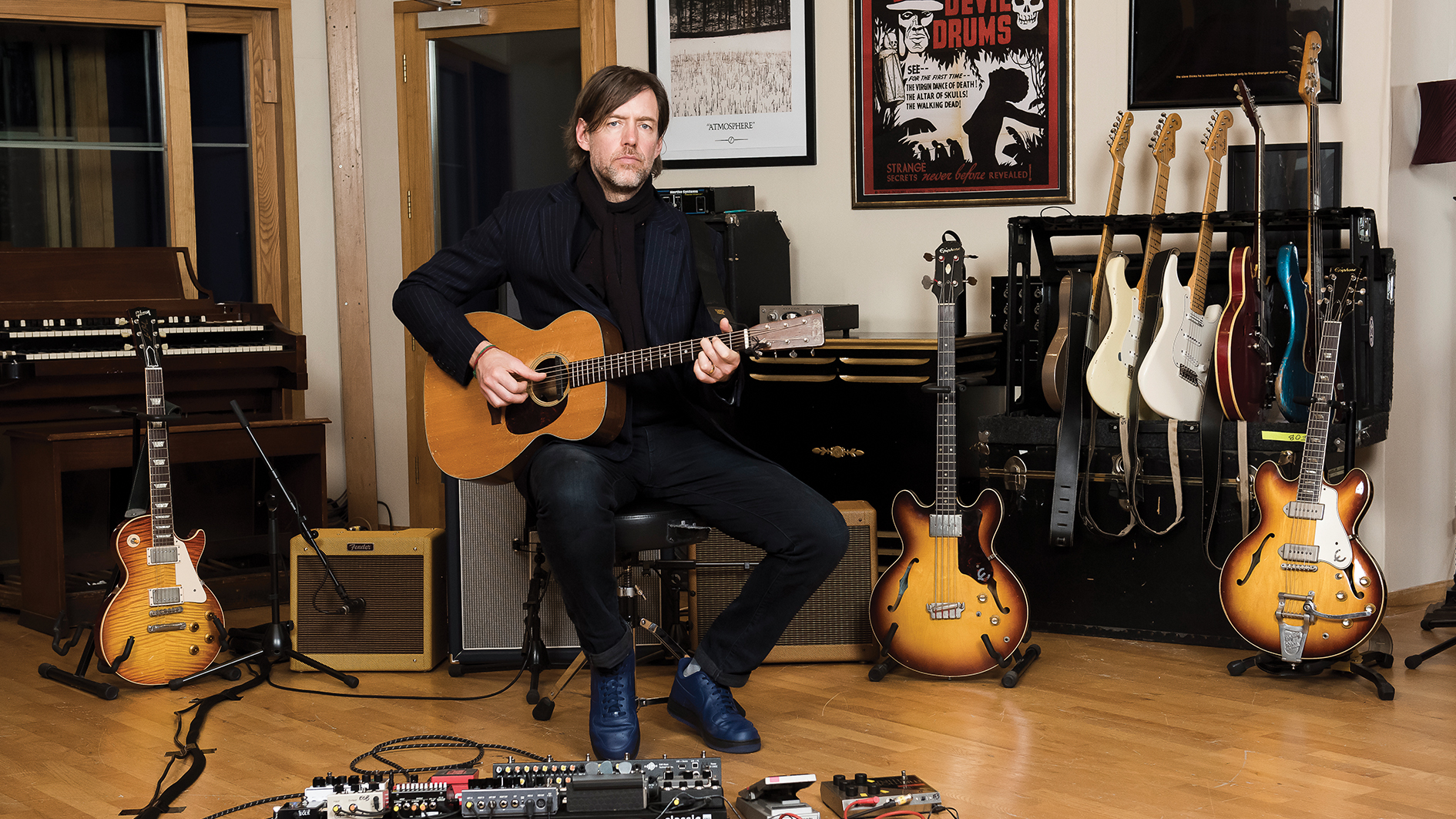
So the foundation was more guitar than synth?
“It was a real eye-opener, which started the process. When we moved back to Britain in 2013 - playing that Martin acoustic in my shed, that’s when things really started happening. I found a way of writing that worked for me. I got out of the way, basically.
"I let it happen and stayed in that semi-meditative state that this stuff gets written in. Once I started demoing with Ian Davenport at Courtyard Studios in Oxfordshire, it was like, ‘Okay - yeah, I want to make a solo record now’. I didn’t know if I would be singing or someone else would, it was more a case of one step at a time, so I did some guide vocals which were enough to start dreaming it all up.”
What’s the story behind the Martin?
I don’t really know what the good shit is, I’m somebody who picks things up to find out
“I bought it in LA around 2009. We were there for the Grammy Awards as In Rainbows was up for Best Album. I had a bit of a spree during that trip; I just felt like I needed some new instruments. I bought that, a ’72 Tele and an old ’68 Fender amp, some kind of 6x10 Silverface.
"I actually bought the Martin from that big store on Sunset, Guitar Center, because they had a big vintage section. I don’t really know what the good shit is, I’m somebody who picks things up to find out. I felt there was a nice tone to it. I wanted something old, wood and folky. It had to feel like it was of the trees and woods.”
Speaking of which, there’s a folky side of you on these recordings that we hadn't quite heard from Radiohead...
“That’s probably because it’s never been in Radiohead! Those parts were the kind of thing that Thom would come up with - he’ll have written a song on his acoustic guitar so those kinds of rhythm picky bits he would play. I mean, Street Spirit (Fade Out) is the only thing I can think of which he had written but I played.
"I did the arpeggio thing, but I can’t remember why I ended up playing it. So those are traditionally his parts. My role in Radiohead is different.
"One of the things I’ve loved about this whole project is I get to play all the guitars! I love all the sonics and sound stuff , but I really love playing rhythm guitar and bass, too.”
The guitars on opening track Shangri-La get pretty hairy at points. What exactly are we hearing?
“That was the Martin going through a distortion pedal and into an amp. I really like how it combined with the bass, that gave it a genuine edge. I’m really into that whole Keith Richards thing, how he used distorted acoustics on songs like Jumpin’ Jack Flash.
"I love distorted electric sounds but they can be so... I don’t want to say ‘cliché’, because that’s not fair, but I can be a bit of a sonic snob, if you like. The greatest distorted guitar sound was Steve Jones on Never Mind The Bollocks.
"That’s how a distorted guitar should sound in my mind. A lot of distorted guitar sounds these days don’t have that element of danger, they’re almost too slick. I like it a bit more crunchy, edgy and not quite right, I guess.”
That song also features some heavily delayed, pitch-shifted guitars - which recur throughout the nine tracks...
“That’s just the DigiTech Whammy and my old Electro-Harmonix Memory Man [delay/chorus], with the vibrato of the chorus right up so it’s modulating. There’s a bit of a trail, maybe some reverb on there, but mainly delay. I’ve been using a Memory Man for years... I used to call it the ‘God’ pedal. Everything that goes through it is amazing.
"That and the Whammy got used all over the album. They’re both such important pedals for me. There’s something about the Memory Man that frames the sound so beautifully, it takes off the edge - because the Whammy can be a harsh pedal, it makes me roll my tone off . I love that side of playing.
"The guitar to me is a bit like an oscillator on a synthesizer, it’s the start of a sound rather than the sound in itself. I love the purity of an acoustic and an electric, but I guess coming from Radiohead I’m more used to treating the guitar like a synthesizer and processing it that way. Anything that can take you into a new range, like a Whammy, is very useful.”
Especially in a three-guitar band like Radiohead...
There needs to be enough separation. You want riffs and melodies that interweave with one another in different registers
“Exactly, Thom might have put something down and how we might arrive there as a band when there’s not much room left. You have to work out what frequencies are missing, so I’ve ended up using things like Whammy pedals or even capos a lot. I like space and air in songs. I hate songs that are full-on the whole way through.
"Well, I don’t hate them but I guess we came from a lot of Britpop in the 90s with distorted guitars the whole way through. We got fed up of that quickly and began to realize space is more important.
"There needs to be things higher, lower and in the middle but with enough separation. You want riffs and melodies that interweave with one another in different registers.”
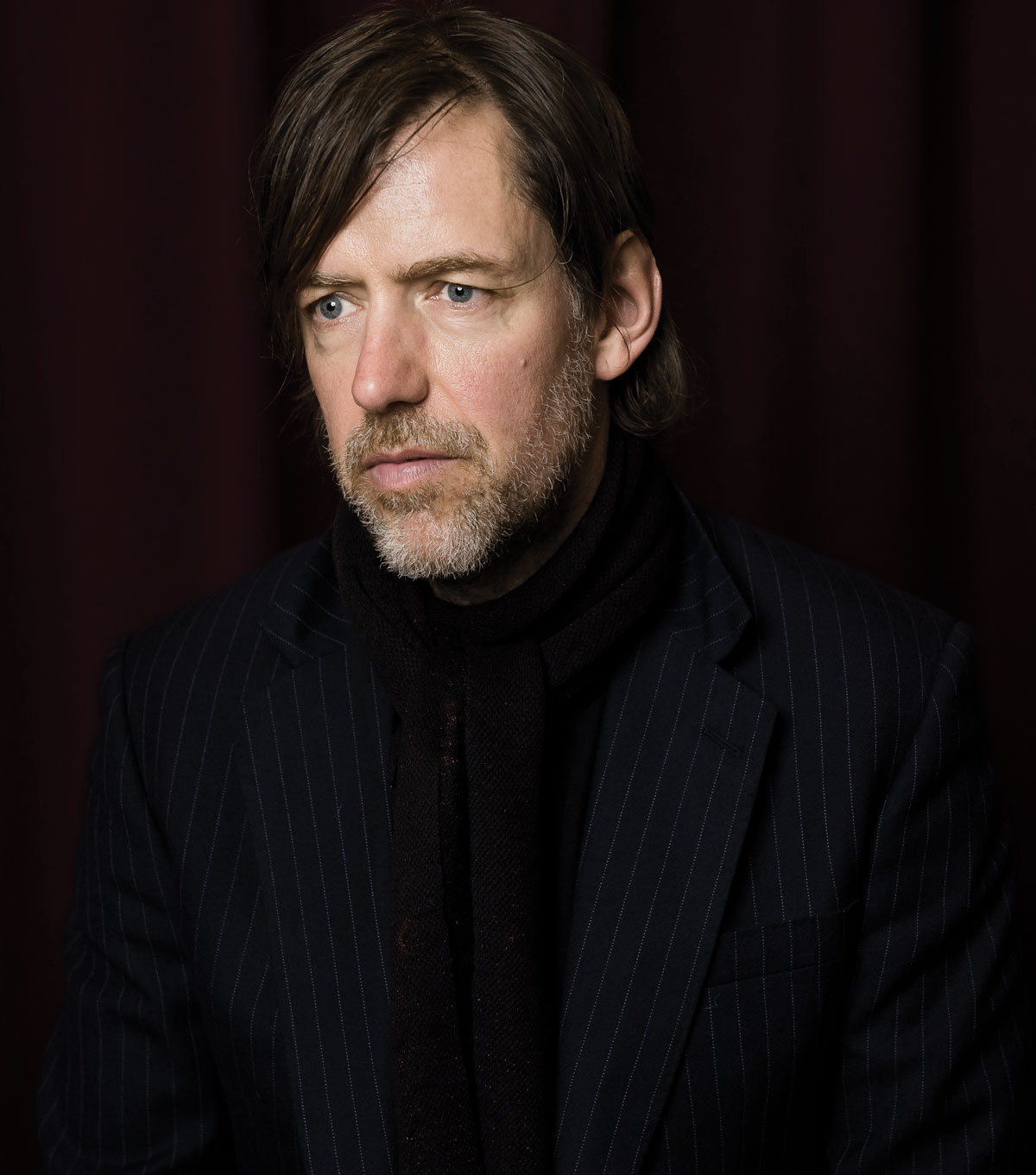
Would we be right in guessing a lot of the ‘synths’ in the song Brasil are actually heavily effected guitars?
“You would, there’s the acoustic guitar in the beginning but in the second half where it goes more dance there are so many guitars in the background.
"The high chiming thing is a guitar. Every part that sounds like a synth is multi-tracked sustainer guitars, like the string-section of an orchestra. Even the deeper bass notes, is a Spanish guitar played in a way that sounds more like a sequencer. Most people would be surprised by how much guitar there is on that track!”
Deep Days has some South American qualities to it - nylon strings, Dorian tonalities...
“I don’t know the theory behind it - clearly you do! (Laughs) In places like Brazil, rhythm, pulse, groove or tempo is everything. People might not even be able to play an instrument, but they’re instant jazz aficionados because they understand the rhythm and the samba.
"It should be danced to, and essentially they’re all dancers! The swing and BPM of that track was really important."
"We had a bit of a discussion with the engineers because they were younger and wanted to knock it down from 78BPM. We tried it at 76 and they were saying it felt more like hip-hop.
"I had to explain it’s not hip-hop and I knew what they meant, but it had to feel slightly pushed. What’s interesting is this song couldn’t have come through at any other tempo. It simply wouldn’t have arrived at 76 or 80 or 88.”
Elsewhere, Banksters seems to revisit some of the alternative rock sounds you started out playing...
“That might be because it’s in 7/8. It’s the mongrel of all these tracks. When I wrote it, there was more of a light Brazilian beat. Initially I wanted it to sound like this Brazilian artist called Jorge Ben, but then get heavier in a T-Rex sort of way during the choruses.
Johnny Marr actually said something great to me once and that was, ‘Don’t be scared of sounding like yourself at times’
"But it wasn’t working, so I programmed a drum machine and we put this electro version of the track on top and crunched up the guitars. It’s a bit of a hybrid.
"I guess it’s the angriest song and the nearest to Radiohead around The Bends or OK Computer. I was aware of that when doing it. Your instinct is to react against what you’ve done in the past, but I realized that’s what the song needed - a distorted chorus - so I just went with it.
"Johnny Marr actually said something great to me once and that was, ‘Don’t be scared of sounding like yourself at times’ and by that he meant it’s alright to do new stuff and if there’s an element of your past in there, so be it. That’s totally fine. It’s no detriment to the song.”
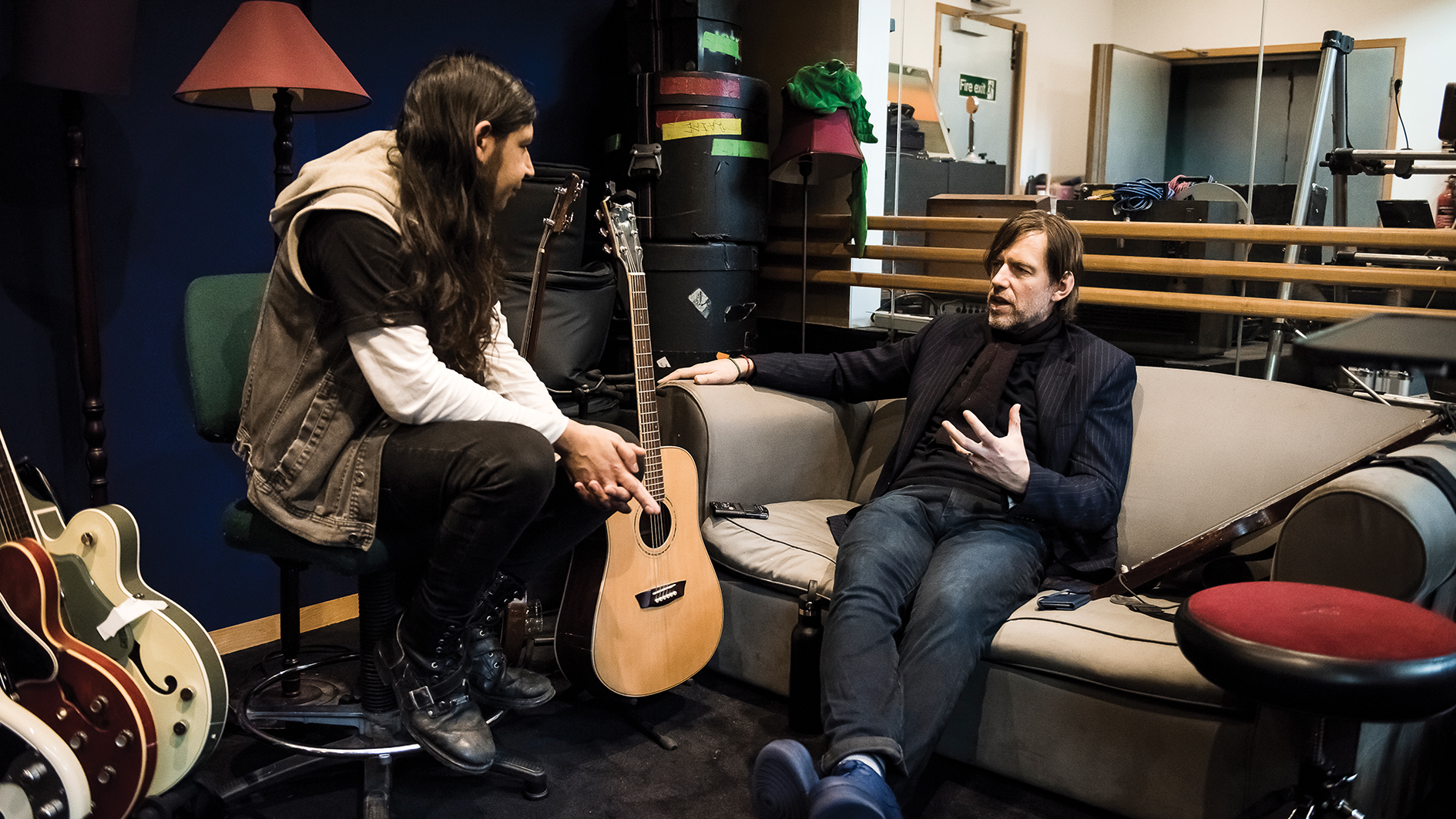
What kind of electric guitars are we hearing on Earth?
“My Telecaster got used a lot. I think the main guitars on this record were the Tele and the EOB Strat, plus my 335 for Long Time Coming. I used my Custom Shop Les Paul, made in 1996, I think, and it’s a great guitar that sounds lovely.
"It’s all over the album, actually. It’s on Shangri-La and a few others, only for clean stuff - sounding so round and warm. It might have been the neck pickup but could even be the bridge with the toned knocked off a bit, because it’s still warm compared to a single coil.
"I played my 1964 Epiphone bass with a single pickup, which sounds really dubby, fat and thick. And I also used a classic 1964 P-Bass too in blue, which plays really nice.”
As for amps, what are the main ones you stuck with?
Your instinct is to react against what you’ve done before
“I mainly used Audio Kitchen, the Little Chopper and the Big Chopper, as well as my Lazy J 20. Those were the main amps for this record. Lazy J is made by a guy in Surrey who builds these Fender Deluxe à la Neil Young-spec amps. They’re really solid and sound brilliant.
"Flood and Alan Moulder got me into the Audio Kitchens, so that’s what I’ve been using live in Radiohead - two Big Choppers with two 1x12 cabs and they sound mental.”
What about pedals? You’re renowned for your heavy usage of effects...
“This is my live 'board with me today - I also have a studio one. There’s a Whammy on there, a Deluxe Memory Man [delay], an Origin Cali76 [compressor], plus a Catalinbread Belle Epoch Deluxe Delay - they make such a great preamp I use that as well.
"For the delay, they used all the same power, preamp and components as an Echoplex, the only difference is that the delay is digital and not tape, but it still sounds amazing. The Kingsley Page is my boost - it’s just a great tube kick to give things a bit more hair and thicken the signal a bit.
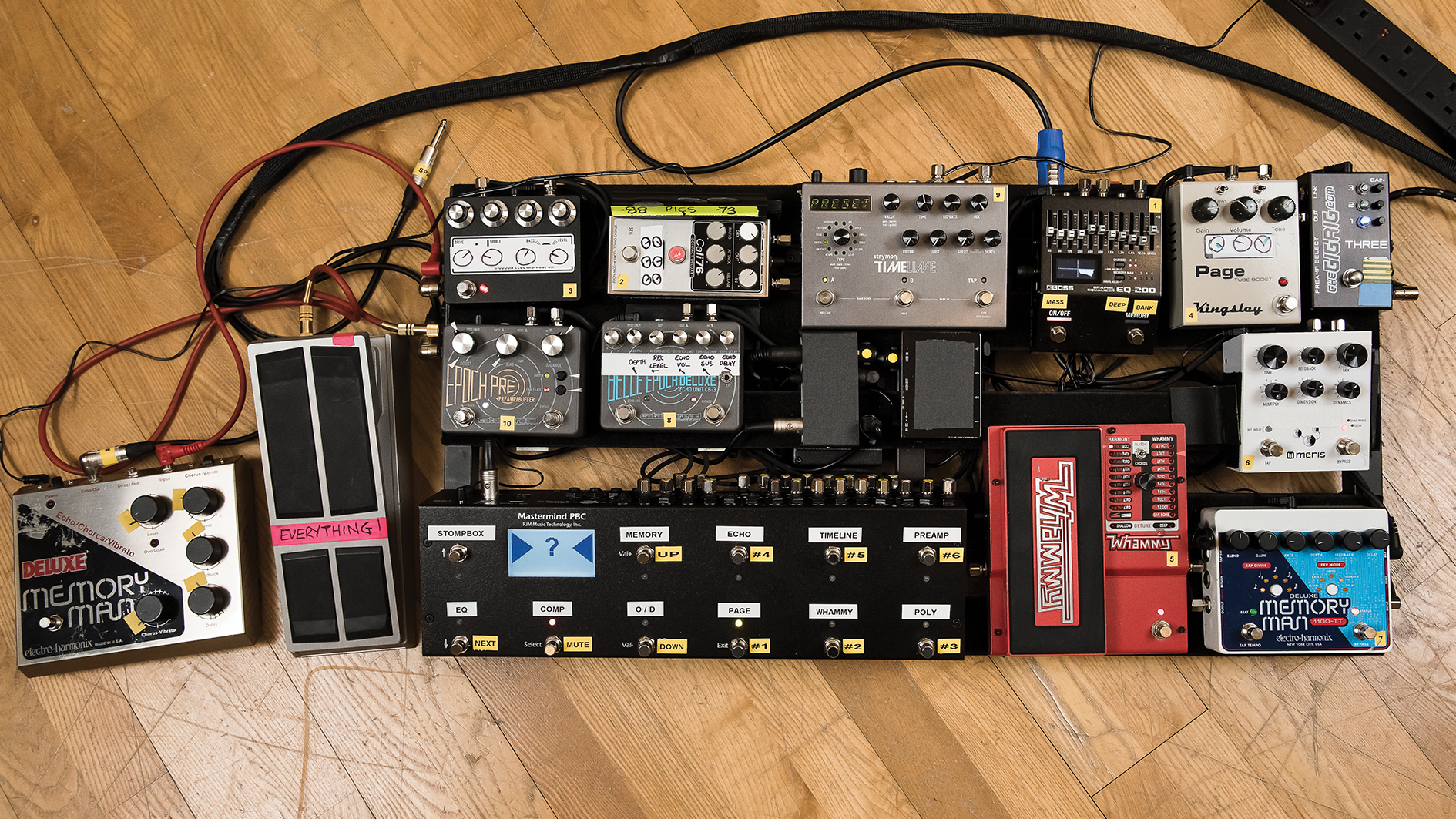
"I also have a ThorpyFX Mushroom Cloud, their version of the Big Muff, which I used a bit too. I also own a Hologram Electronics Infinite Jets. I love that thing, it’s like an amazing synthesizer. I invited the guy who made it, Ryan Schaefer, to a Radiohead show.
"He told me he was trying to build this pedal that you literally had on your shelf but don’t necessarily use the whole time. It helps create sounds that are different, you won’t be sure how you got there... But you did!
"It’s one of those go-to pedals when you need something unusual. It makes your guitar stutter or sound like an accordion with backwards reverb. It’s seriously good.”
Are there are any other pedals that aren’t on this 'board that you like to use?
You could say tape delays are really important for me!
“I’m also a big fan of Chase Bliss Audio pedals. They’re made by Joel Korte and he has this new pedal out called the Blooper. I used his red delay pedal a lot on this album, it sounds fantastic.
"I also went to Soundgas who are up in Derbyshire and bought a Binson Echorec P609 or 603. It’s a great delay. I also bought a Roland Space Echo and a Korg Chorus Echo - all tape echoes - plus an Echoplex EP2. You could say tape delays are really important for me!
"I also used the old Korg SDD-3000 from the 80s. It’s probably one of the main reasons I don’t use the TimeLine as much, it’s so pristine. The Belle Epoch and Memory Man are fantastic analogue delays with amazing chips in them.”
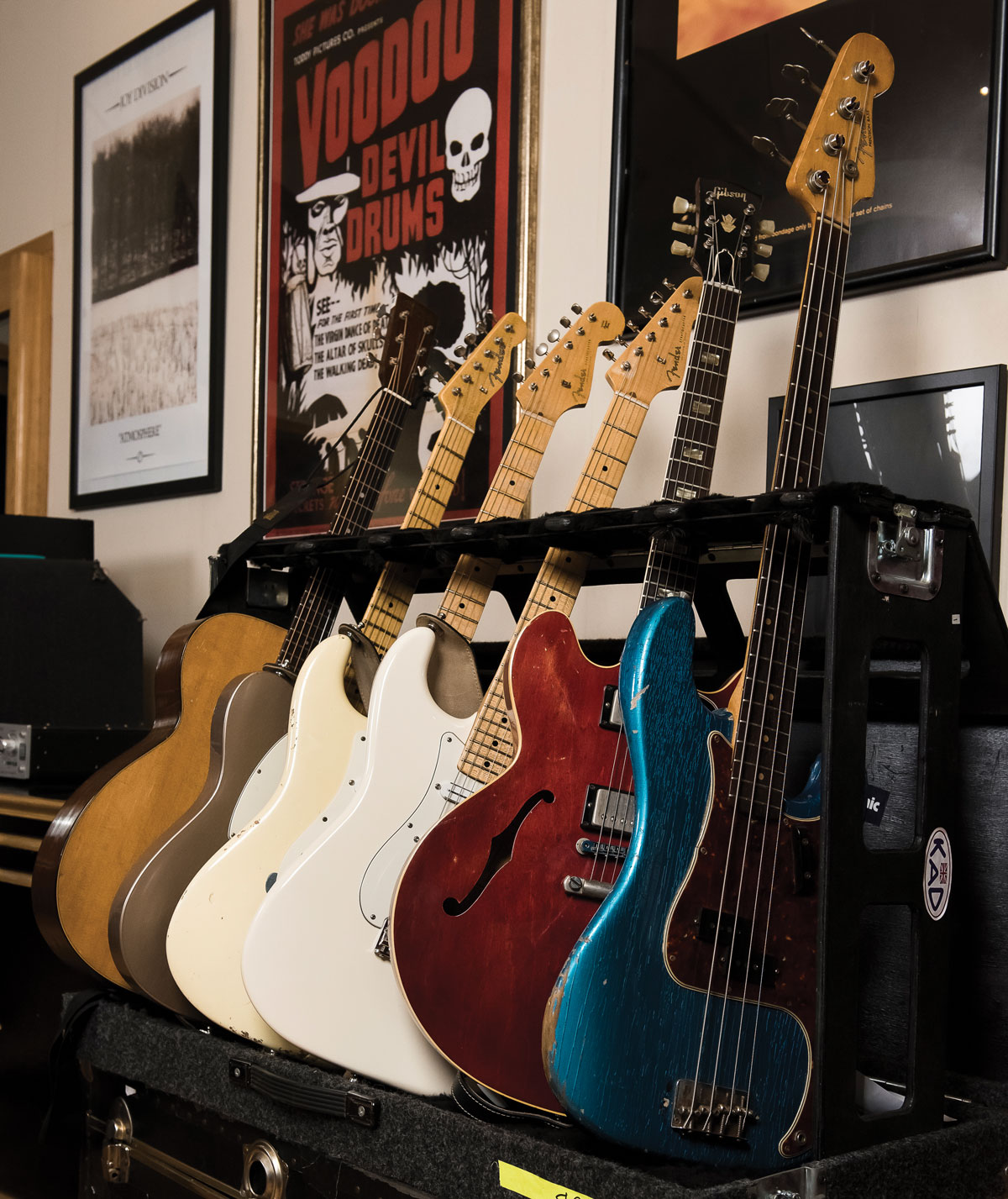
You certainly have plenty of options when it comes to delay...
“I find delay really inspiring, but it needs to have character. There’s another one I have, the Meris Polymoon, which is also great. I haven’t dug deep enough but it’s such a cool delay with some great features like flanging and pitch-shifting. I needed a pedalboard that could do the job but also have enough future potential.
"When you get pedals, you have to invest time into those sounds. You need something you can investigate and dig deep on. This is great for that. I only really use the Timeline for its built-in looper. I also used a wah pedal a lot to sweep and take off the top.
"On Olympik, it’s the wah going into a Memory Man and it sounds like a Rhodes when you get the delay right. People have been doing that for years, Mick Ronson did that a lot and Matt Johnson from The The was similar.”
There’s a fair few guest appearances, too, from Nathan East and David Utley to Laura Marling and another member of Radiohead...
“I had some incredible musicians playing on this - drummers Omar Hakim and Glenn Kotche, Nathan East and Colin Greenwood on bass, Laura Marling, David Okumu and Adrian Utley (Portishead) on guitar... Adrian did this great guitar that comes in during the outro of the opening track. I don’t know why but I call it the Alex Lifeson riff.
"It’s a Rush kind of guitar, at least in my head.”
It’s interesting you mention Rush, as many would describe Radiohead as a progressive rock band of sorts...
“It’s funny, I don’t know any King Crimson. Or Rush, really. I had a friend who was into Rush though so I knew early '80s songs like New World Man and The Spirit Of Radio.
"I only knew the poppy side. The reason I mentioned them is because I just saw that documentary on them. It’s so beautiful that friendship they had, the love they had for each other.
"I have a huge amount of respect for them, as I do for all musicians. The older I get, the more I respect other things. Pink Floyd, my dad was a massive fan. I didn’t really like them until probably quite recently. Now I love Wish You Were Here... That’s just mind-blowing genius. Shine On You Crazy Diamond is amazing.”
But growing up you were more of a punk at heart?
The first kind of music I was into, back in the '70s, was The Beatles. There was so much melodic structure and all these pop sensibilities, even in their most experimental moments
“Yeah, I guess the whole post-punk thing felt more all-encompassing to me. I needed more of a melodic structure. Actually, the first kind of music I was into, back in the '0s, was The Beatles. There was so much melodic structure and all these pop sensibilities, even in their most experimental moments.
"Things like King Crimson were a bridge too far for me growing up, but it would be interesting to listen to them now. I guess I was taken by the whole dance wave when that Second Summer Of Love and acid house thing came along in 1988. That was massive.
"You can hear the dance influences in my own music, like Brasil. I wanted to have that trance-like quality. So that kind of electronic stuff has been more influential to me than Yes or King Crimson. I was at that age where I wasn’t old enough to have seen the good [prog rock] stuff.
"It felt quite self-indulgent, and then punk had come along. I guess I was just more into the two-minute songs.”
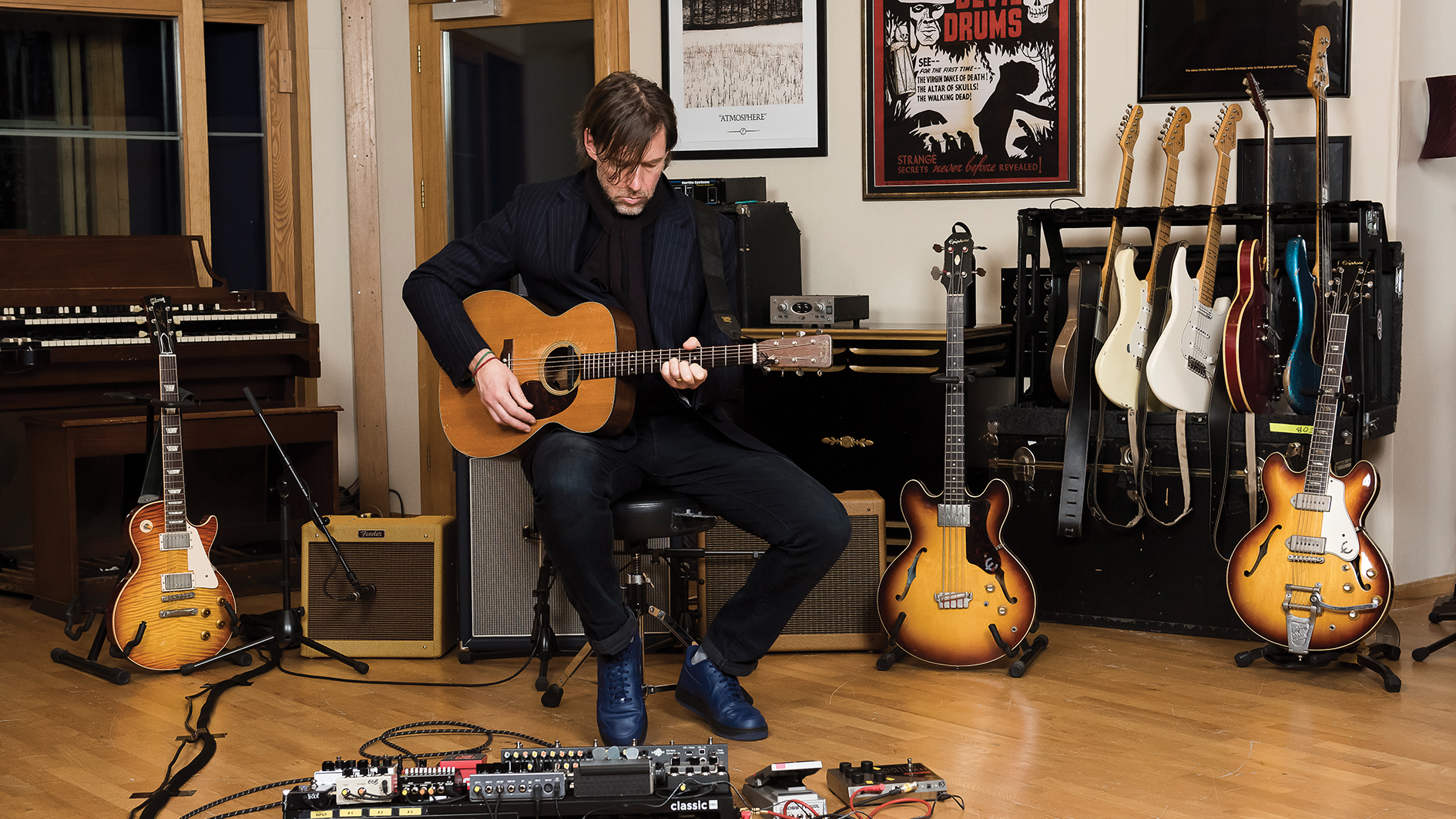
It’s interesting how many genres you’ve dipped and dived through over the years. Is that musical openness a key to the success?
“I think the underlying thing in Radiohead has always been the truth, really. That’s what we’re looking for creatively. When we made OK Computer, everyone was expecting The Bends part two. Same thing happened again with Kid A. We were just fortunate - the things we felt that were right to do were like left-turns.
"I don’t think we were doing it deliberately, in order to be different, it was more like, ‘We’ve done that so let’s move on’. We liked the idea of being the Stanley Kubrick of bands. We wanted to make our Dr. Strangelove, then our 2001: A Space Odyssey, our Barry Lyndon, our Shining and Full Metal Jacket.
"It wasn’t necessarily trying to be willfully different, we were just creating and exploring. It all came down to not getting bored and ultimately that came down to our DNA. I remember people telling us we were being weird every time we came out with one of these albums but it was like, ‘Yeah... But David Bowie would have done that!’”
David Bowie is great comparison when it comes to reinvention and risk-taking...
I think people like the idea of artists doing things that aren’t safe - but you’ve got to be willing to fall flat on your face
“I think people like the idea of artists doing things that aren’t safe - but you’ve got to be willing to fall flat on your face. And sometimes those moments you do feel worse than they actually are. History and hindsight can be kind to those moments because they came from an artistic point of view.
"With Radiohead, we never tried to be the biggest band in the world. Trying to be the best band in the world in one thing, but not the biggest. When you get into that, you become more aware of alienating people.
"There are some people who love Pablo Honey, The Bends and OK Computer and didn’t like Kid A.
"When we got into that whole Radio 1 circuit with OK Computer, it was us, The Verve, Oasis and Blur... We were all in there. Maybe some of those people who liked the guitar bands and went to the V Festival heard Kid A and thought, ‘Not fuckin’ listening to this shit, what’s this bollocks?!’ You can’t please everyone.”
A Moon Shaped Pool came out in 2016. Any idea on when Radiohead plan to release the follow-up?
“I’m sure there will be another album. That last record was a lot of old songs, which explains the different eras of Radiohead it might have sounded like. It will definitely happen, but when that is, I have no idea...”
Amit has been writing for titles like Total Guitar, MusicRadar and Guitar World for over a decade and counts Richie Kotzen, Guthrie Govan and Jeff Beck among his primary influences as a guitar player. He's worked for magazines like Kerrang!, Metal Hammer, Classic Rock, Prog, Record Collector, Planet Rock, Rhythm and Bass Player, as well as newspapers like Metro and The Independent, interviewing everyone from Ozzy Osbourne and Lemmy to Slash and Jimmy Page, and once even traded solos with a member of Slayer on a track released internationally. As a session guitarist, he's played alongside members of Judas Priest and Uriah Heep in London ensemble Metalworks, as well as handled lead guitars for legends like Glen Matlock (Sex Pistols, The Faces) and Stu Hamm (Steve Vai, Joe Satriani, G3).
“There’d been three-minute solos, which were just ridiculous – and knackering to play live!” Stoner-doom merchants Sergeant Thunderhoof may have toned down the self-indulgence, but their 10-minute epics still get medieval on your eardrums
“There’s a slight latency in there. You can’t be super-accurate”: Yngwie Malmsteen names the guitar picks that don’t work for shred


![A black-and-white action shot of Sergeant Thunderhoof perform live: [from left] Mark Sayer, Dan Flitcroft, Jim Camp and Josh Gallop](https://cdn.mos.cms.futurecdn.net/am3UhJbsxAE239XRRZ8zC8.jpg)







